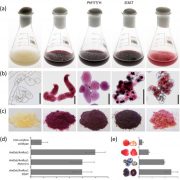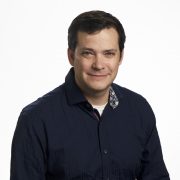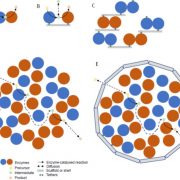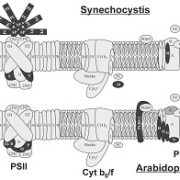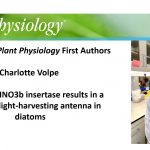Interviews with Synthetic Biologists: Sunil Chandran, Amyris
Synthetic biology is a set of tools, a way of thinking, the integration of engineering principles into biological sciences, and potentially the biggest opportunity for advances in plant sciences since PCR. Yet many struggle to define it, and fewer still grasp its full potential.
What is synthetic biology all about? To answer this question, we have conducted a set of video interviews with leaders in the field of plant synthetic biology, in both academic and industrial arenas.
In the tenth and final episode of this series Interviews with Synthetic Biologists, Jaya Joshi, Postdoctoral Researcher with Andrew Hanson at the University of Florida, interviews Sunil Chandran, Senior Vice President of Research and Development at Amyris, a leader in the research, development and production of pure, sustainable ingredients. Amyris is well-known for its development of semi-synthetic artemisinin.
Dr. Chandran has a PhD in Chemistry from Michigan State University. At Amyris he he oversees the development of microorganisms that efficiently convert plant-derived feedstocks to a chemicals for use in a wide range of applications including pharmaceuticals, fuels, fragrances, food, nutraceuticals, and cosmetics among many others.
Jaya Joshi interviews Sunil Chandran from Plantae on Vimeo.
A lightly edited transcript is below.
JJ. Hello everyone, my name is Jaya Joshi and I am a postdoctoral fellow in Dr. Andrew Hanson’s lab at the University of Florida. Thank you all for joining us in an exploration of the plant synthetic biology world. This is one of a series of interviews where we are talking to researchers from academia as well as industry.
Today joining me is Dr. Sunil Chandran, Vice President, Research and Development at Amyris, a leading synthetic biology company. A warm welcome to you Dr. Chandran, and I hope you will enjoy this conversation as much as our viewers will.
SG. Thank you Jaya.
JJ. I will start right away with one question that everyone thinks is very important because Amyris is a pioneering company of the synthetic biology world. Could you please tell us about your recent research focuses and what are your plans for the synthetic biology future?
SC. Amyris’s current focus remains what it has always been, which is clean manufacturing powered by biology. Our goal is really to change current paradigms for how different chemicals for different markets are produced.
So today they might be produced from animal waste or form petroleum feedstock. Our goal is to provide an alternate manufacturing process for that same molecule without the consumer having either to pay more for that same molecule or make compromises on quality or where the source comes from.
It’s what we call a no-compromise solution to existing molecules that consumers use already.
What we do is we try to identify targets where we believe synthetic biology can provide viable solution, and then go after that molecule by developing an R&D plan around it, and then manufacturing it at one of our many manufacturing locations, and then working with a partner who understands how to take that target molecule to the marketplace.
Most of our manufacturing is done using Saccharomyces cerevisiae, which is a host that everyone is familiar with, it’s baker’s yeast. We can feed it a variety of sugars, it can be sugar cane in Brazil, or corn sugar in the US, so they are agnostic to the feedstock we use, and we can access multiple markets using this technology.
JJ. How challenging is it to introduce a plant pathway into microbial system and then test it and actually release it for the public’s use?
SG. So the question is rather, do you need to introduce a plant pathway into the microbe, or can you find a similar pathway from another host? Take the artemisinin project for example. Artemisinin is made by a plant, Artemisia annua. Now if you were to take the exact pathway form the plant and try to put it into the microbe, I think that would be very difficult. But, we know that similar pathways exist in microbes like E. coli or Saccharomyces, so we end up optimizing that pathway and then just taking a small chunk that is very specific to the plant and introducing that into a microbe like yeast or E. coli.
The challenging part with that is of course you need to think about what is specific about the way that protein is expressed in a plant, so you usually have some sort of a targeting sequence which localizes the protein to a certain compartment within the plant cell. You have to account for that when you are trying to express that same protein in yeast or E. coli. So those are some of the challenges associated with it. There are ways to circumvent some of those challenges.
Some challenges are still difficult. For example, maybe the active ingredient that you get from a plant is actually not a single molecule but is a mixture of different molecules that all work together to give that desired activity. In cases like that, it becomes a little more difficult to predict how to get that same mixture of molecules from a fermentation source. But there are solutions for a lot of these problems, and the question then is, is synthetic biology the right solution to address that very problem that you’re trying to solve.
JJ. As a leading synthetic biology company, Amyris is known for its state-of-the-art automation facility. What are your thoughts on the importance of robotics or biofoundries in synthetic biology, and do you think these will come to the plant world also?
SG. Fantastic question. Let’s put it this way. Biology is highly unpredictable. We all know that, we all deal with that every day. So if you need to optimize a strain or a plant for a certain trait, you have to go through multiple iterations through the Design-Build-Test-Analyze cycle. Progress is measured by how quickly you can go through this Design-Build-Test-Analyze cycle per unit time, and how many times you can go through this cycle per unit time. The third one is quality.
Now if I run only one experiment a month, the amount of data I get from that experiment is going to be very low, and also like I said, biology being unpredictable, I’m just guessing as to what the right hypothesis is and how I should test it. Now instead, if I have say a thousand experiments I can run in a single month, the amount of data I can get is a lot higher, and I can test more hypotheses in that single month and collect all that data and then try to understand what to do next.
Again, biology tools tend to be quite manual, and so this is where automation software really plays a big role. Because there’s no way for us to access the solution space in biology without relying on automation and software. So of course we’ve been doing this at Amyris for close to a decade now. I feel that this same philosophy does apply to plant biology. There are certain tools that you can apply in plant biology, for example how can you introduce DNA into a plant cell in a predictable fashion, and can you do that a thousand times in a day, just like you would do with Saccharomyces. When you can start doing that you can see the rate of progress starting to get better and better in the plant biology world.
JJ. That leads to my next question…. I was in biotechnology company before for a couple of years to get experience of what industry looks like, and what I saw was that there was a long gap between the academic and industrial system and there was always a need to bridge that gap. So my question is, because you have such a good power of automation, robotics, and all those systems, so how are you going to bridge the gap between academia and industry and take synthetic biology in a totally different era.
SG. Good question again. What we have done at Amyris, we work quite closely with quite a few academic labs and government institutions. We sit on the advisory boards of a lot of academic biofoundries that are coming up and we try to advise them, “Here are the lessons we have learned when we built our biofoundry, maybe you should go in a slightly different direction”.
The other question is, what problems are they trying to solve in the academic setting. Academic labs are best at doing the basic discovery and trying to understand the basic systems behind what we are trying to study. Industry will never be the one that tries to understand the exact mechanism of an enzyme. That is something that academics will discover.
CRISPR/Cas9 was discovered in academic lab. But it will be industry that ends up using it for other practical applications. Both industry and academia have very important roles to play in making sure that synthetic biology progresses and keeps offering new solutions to the consumer and the world. To ensure that they are both solving the right problems and solving them together, like I said, Amyris works with a lot of academic labs, we currently have active collaborations going on with academic labs where we have identified technologies that that lab is the world expert at, and there’s no need for us to reinvent the wheel, instead we work with them.
We of course sit on advisory boards of academic labs and institutions and talk about the lessons that we learned so they don’t repeat the same mistakes as us. It is really important for us to work with academic collaborators. I don’t think either party will say that they will solve all the problems.
JJ. This is a very interesting answer. Our audience is going to be young synthetic biologists who are new to it, including me. So my question is, we have seen synthetic biology emerge as cross-talk between various disciplines, like engineering, basic sciences, as well as computer science, so as an R&D head, so you think having hands-on experience in a basic programming language as well as a systems modeling kind of thing is a good asset for a candidate who wants to explore the industrial synthetic biology route?
SG. I would definitely say yes. Is it a requirement? No, because you’ll end up picking up those skills when you join a company like Amyris. But I would say, for the young synthetic biologist, yes, learn some basic programming languages. Learn some basic statistical languages. The way the field is going, with how much data we’re starting to collect, having some background in statistics will also be as important as having basic programming skills. It’s just where the field is heading. Having a broad background in biology and learning how to apply computer science and statistics to solve biological problems is going to be very important in the next decade or so. .
JJ. I think you missed one thing that I learned about you, which is that you are a trained chemistry engineer. In my field I feel that there is very much importance about chemistry. Do you feel that synthetic biology is like a marriage between chemistry and biology? Do you think having a very strong chemistry knowledge is good for a budding synthetic biologist to be successful in the field?
SG. Is it an asset? Yes. I am an organic chemist by training, so for me to make the transition to metabolic enginnering was actually not as difficult as someone who’s going from maths to biology. Is it a requirement? Probably not, it depends on the problem you’re trying to solve. If the scientist is someone who’s trying to understand what an enzyme is doing, how to improve that enzyme for a given mechanism, then Yes, having some chemistry idea on how the reaction proceeds will definitely be useful. But really, trying to understand how the cell is going to respond to a certain genetic change, I don’t believe you need a strong chemistry background to really study that process for example. So is it an asset, Yes. Is it a requirement? I would say No. Of course it depends again on what role the scientist will be playing in the company. If you’re an enzymologist, Yes, you should have some chemistry background to help in that job. But if you’re a geneticist, probably not.
JJ. You have literally seen an era of growth of SynBio from 2000 when it was just starting to develop, and now it’s growing very fast. So what kind of future do you see in five years, especially in the plant synthetic biology world?
SG. I’m absolutely fascinated by plant biology and how synthetic biology can be applied to that. Some of the technologies that are really fascinating which I think will be quite pivotal in the next five years, one How can you engineer plants to be better at nitrogen fixation? There are companies and labs working on technologies to quickly develop plants that will end up using less fertilizer the cells can fix nitrogen much better and their growth rate can increase. I’m not a plant biologist, so I’m speculating on what the field can and cannot do. But I feel that really fascinating, and will have real impact on the world itself. You know, we have a growing population in the world, people need more food. A way to get around that is to improve the way we grow crops for example. I see synthetic biology playing a huge role in how we can imrpove crop technology. How can you get by with less resources and still feed a growing planet. For me that is really fascinating and hugely impactful to where the field is going right now.
JJ. As a person who has changed from the chemistry to the synthetic biology world, and you have seen how this era emerges, what kind of a message do you want to give to the young person like me who wants to enter into a synthetic biology career but is still skeptical about the future. What kind of message do you want to give to young synthetic biologists.
SG. This is a fantastic time to get into the synthetic biology space. Should you be skeptical about the future? Absolutely, But as a young upcoming synthetic biology scientist, you can define what that future looks like. So you might be skeptical about it, which is good, because then it allows you frame what the problem is you’re trying to solve. I think that’s what I would advise a lot of young scientists to think about. What solution are you trying to get at. What are you trying to solve for? When you figure out what you’re trying to solve for, you can figure out the solutions to get there. And that then allows you to understand how do you want to approach the field. But really, if you’re just doing this because it’s neat science or because you feel like you’re interested in it, that’s great, but think of what you’re trying to accomplish in the next five years.
How is the world going to be a better place because of the technology you have developed? Starting with that, I think it’s a bright future for everyone in this field, and the field of course becomes better because of that.
JJ. Thank you so much for your time and those great ideas from you. I feel like most of us will be pumped up and think about the future as synthetic biologists. So thank you very much for your thoughtful ideas and encouragement.
SG. Great questions, thank you very much.
Amyris is currently exploring the production of CBDs from yeast usuing a fermentation method. See more CBD from fermentation delivers consistent purity and higher yields, says Amyris
Jaya Joshi has a BSc in Agriculture from Pantnagar University and MSc in Plant biochemistry from University of Agriculture Sciences, Bangalore in her native India. She started her career working as a data mining scientist for Monsanto and later moved to Global marker technologies team of Pioneer-Dupont. She then moved to Canada for a PhD in Cell and Molecular Biology at the University of Western Ontario, studying sulfur amino acid metabolism in developing bean seeds. Since November 2017 Jaya has been a synthetic biology postdoc in the Hanson lab at University of Florida where she is working on metabolic parts-prospecting and on continuous directed evolution of thiamin synthesis enzymes. Follow Jaya on Twitter at @JayaJoshi20.
- Previously in this series:
- Steven Burgess interviews Professor Jennifer Nemhauser, University of Washington.
- Steven Burgess interviews Michael Mendez, Renew Biopharma.
- Steven Burgess interviews Matthew Mattozzi, Conagen Inc.
- Jenna Gallegos interviews Tobias Erb, Max Planck Institute for Terrestrial Microbiology in Marburg
- Jenna Gallegos interviews Guillaume Barbier, Joyne Bio.
- Jeanna Gallegos interviews Karsten Temme, Pivot Bio.
- Henrik Toft Simonsen interviews Paul South, Louisiana State University
- Mary Williams interviews Kevin Chen, hyasynth
- Jaya Joshi interviews Cathie Martin, John Innes Centre


